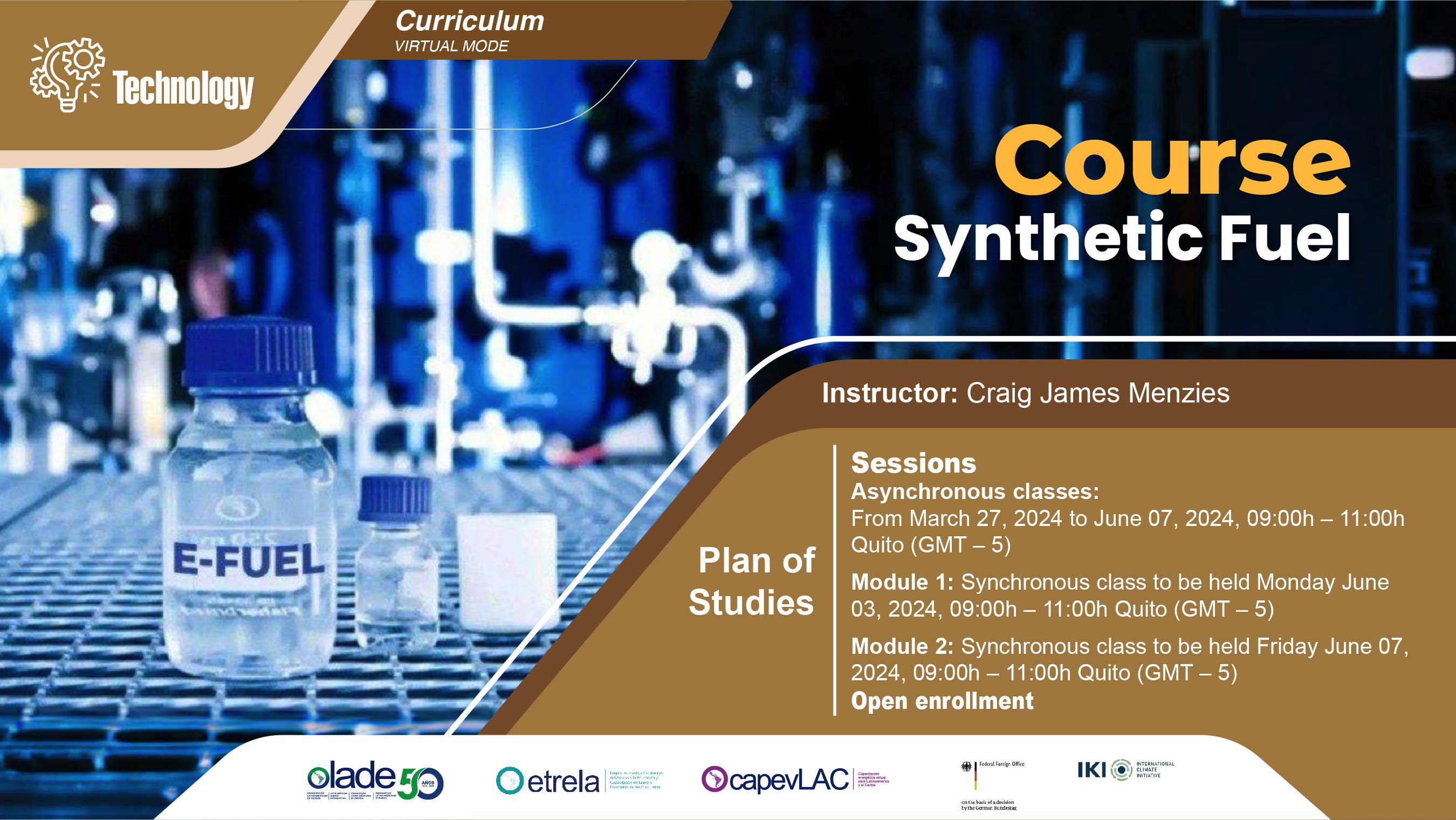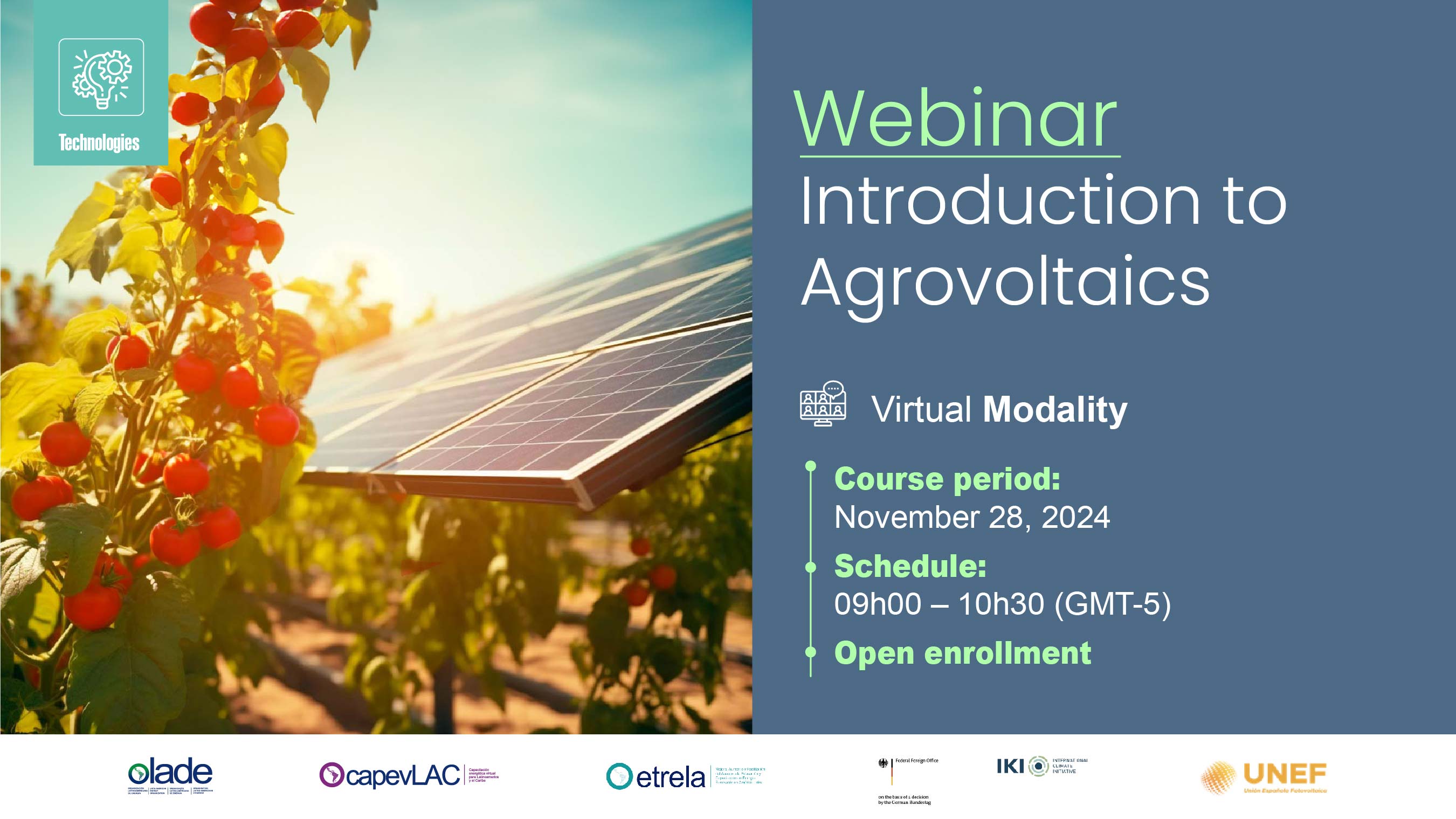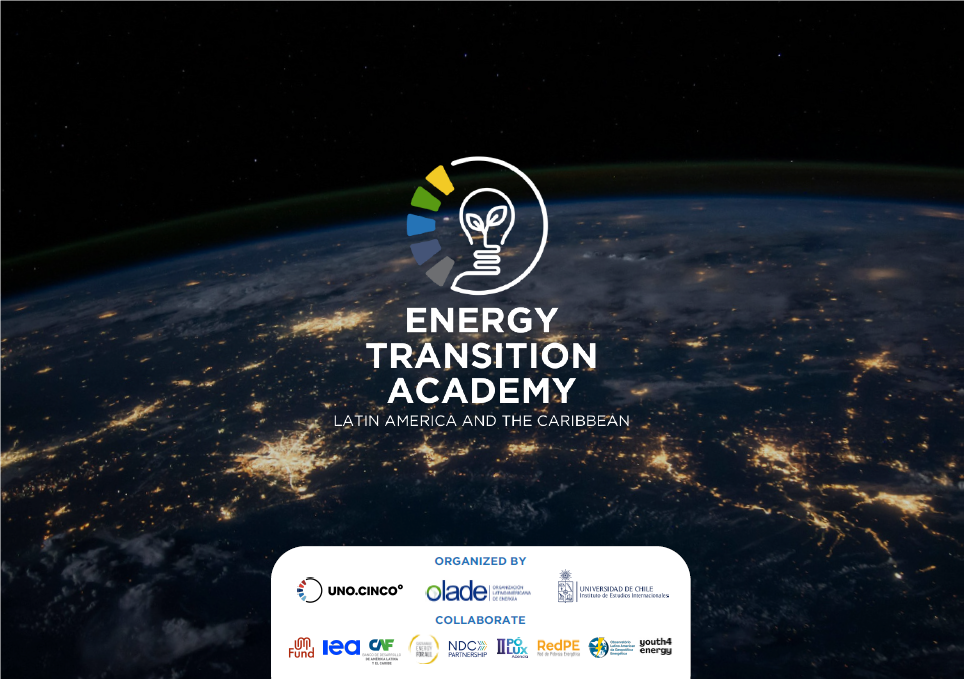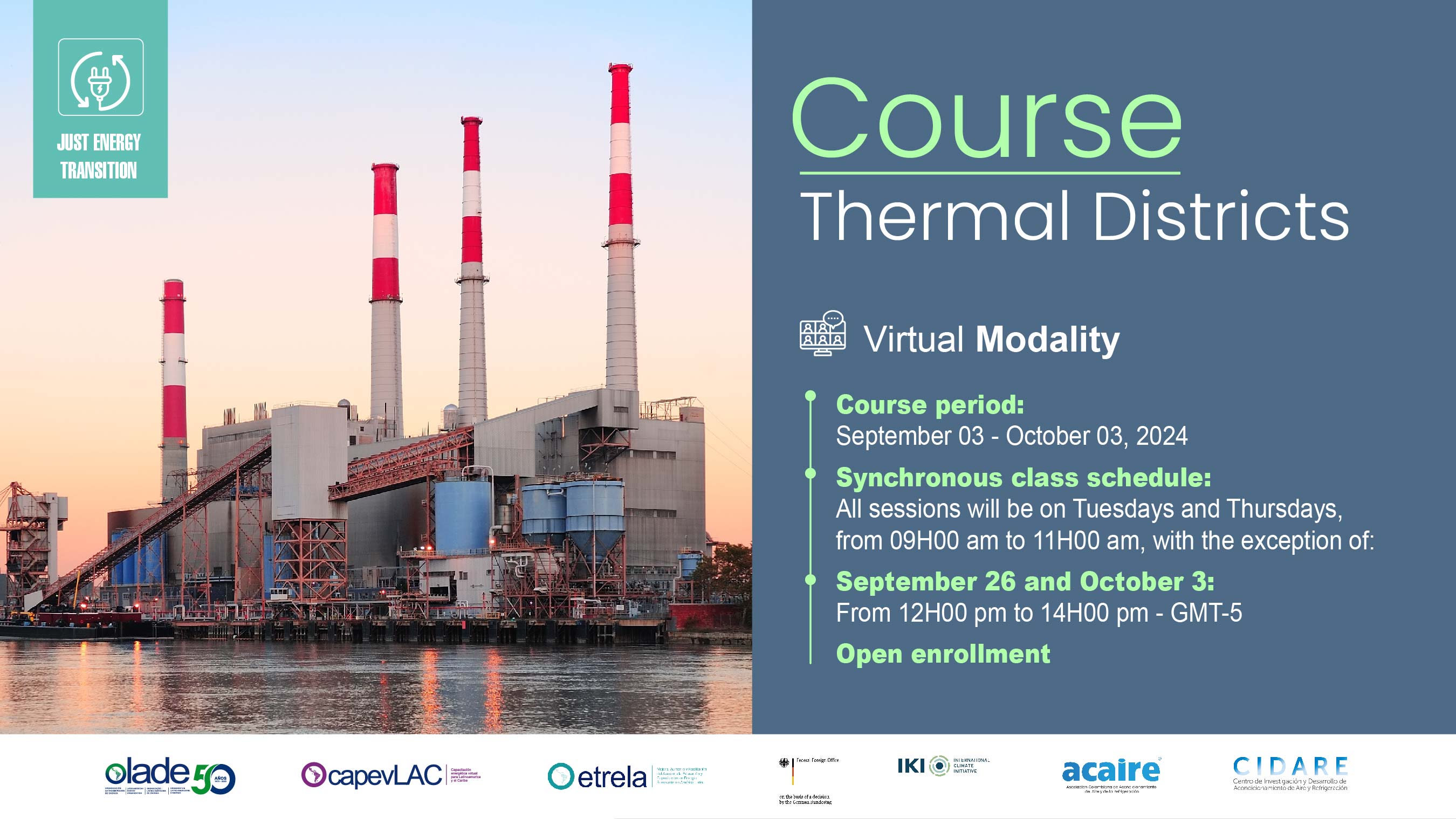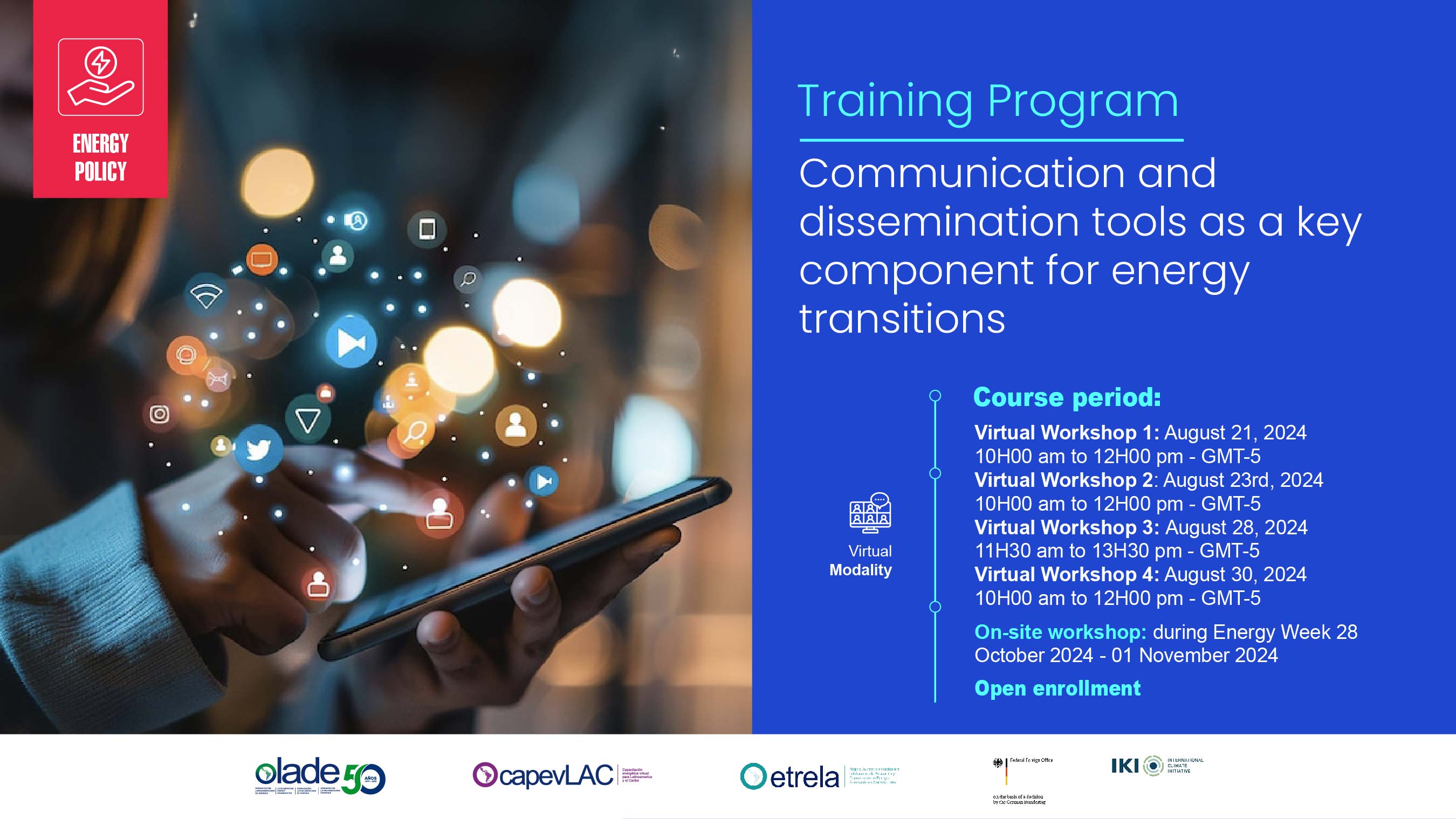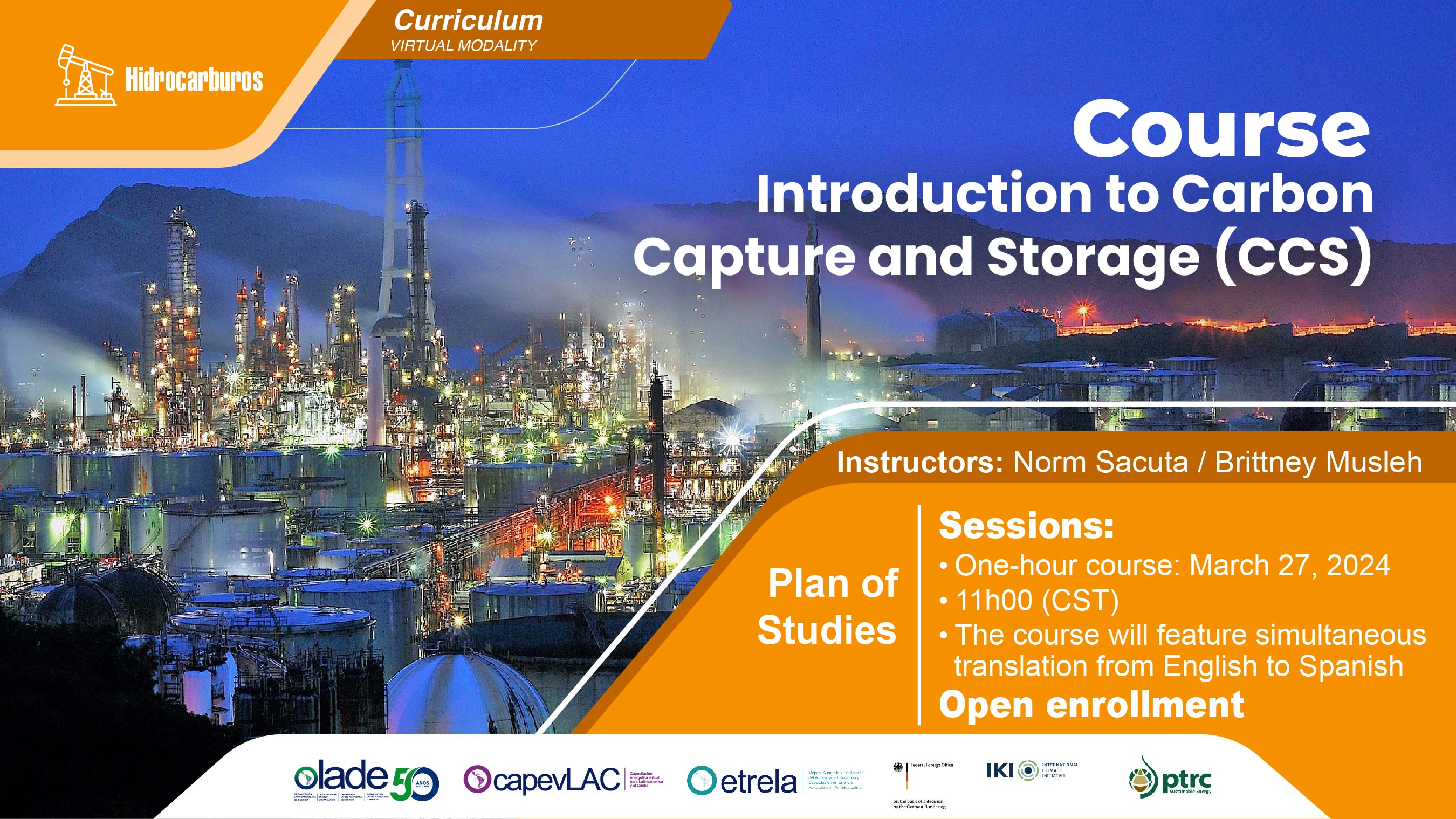- Introduction
This course in “Synthetic Fuels” will be implemented within the Project 19_I_340_LAC_M_Access to RE E&T called (by its name in English) “Improving, Increasing and Facilitating Access to Renewable Energy (RE) Education and Training in Latin America (LA)” – ETRELA (funded by the Federal Ministry of Economy and Climate Action (BMWK, for its acronym in German). OLADE leads the consortium that implements the project, which has several training courses on issues of importance for the energy transition in Latin America.
Synthetic fuels, such as biofuels such as biodiesel and bioethanol, are presented as an alternative to reduce greenhouse gas emissions, reduce dependence on fossil fuels and mitigate environmental impact.
Such fuels are synthetically produced from hydrogen and carbon dioxide. In turn, the hydrogen that is used can come from the electrolysis process powered by electricity generated by renewable energy sources. In addition, the development of the synthetic fuel industry can promote job creation, rural development and energy security in the countries of the region, thus contributing to more equitable and sustainable economic growth.
Since synthetic fuels are not very different from fuels derived from fossil sources, their requirements and impact at the level of infrastructure and technology do not imply a pronounced change in consumer consumption patterns, which helps them to have a better acceptance.
- Presentation of the Study Plan
The course will have a “non-synchronous” format, based on the principle of “Massive Online Open Course“.
The training will be carried out over a period of about two (2) weeks, based on the study of materials, directed readings, and the performance of practical exercises.
The course consists of a series of eight (8) modules, specifically:
- Introduction to Synthetic Fuels: what are they and why are we interested?
- General introduction to the main Synthetic Fuel technologies
- Technical characteristics of Synthetic Fuels
- Transportation
- Storage
- Purchase and sale of products
- Economics of Synthetic Fuels
- Main cost factors
- To what extent are Synthetic Fuels competitive?
- Outlook: how cost-competitive can they become?
- The main drivers of Synthetic Fuels
- Decarbonization of the energy sector
- The role of innovative low-carbon fuels
- The “sustainable” framework (“EESG”)
- Reuse of existing energy infrastructures and competences
- Emerging markets in the international context:
- Demand
- Value chains
- Business models
- Current status
- Challenges for the development of Synthetic Fuels sectors and markets
- Initial projects and initiatives
- Success cases
- Supporting the timely development of successful Synthetic Fuel markets
- Energy policy
- Rules and regulation
- Instruments and incentives
- Demonstration projects
- Value Chain Planning and Training
One (1) synchronous (live) training class will be held per week, being two (2) classes in total. These classes will be interactive with participants attending to their queries.
- General objective of the Study Plan
The overall objective of the training course is to provide a solid introduction to synthetic (low-carbon) fuels. Specifically, to give course participants an understanding of the technical and economic characteristics of these fuels, their benefits and limitations, and the main drivers of market development.
The course will also provide participants with an overview of the current state of the sector and the market on an international scale, the main demand centres and business models with high investment potential. And how energy authorities can support the timely and successful development of synthetic fuel sectors and markets through careful planning, policy, regulation and support systems.
- Study plan learning outcomes
Upon completion of the training course, the student will be able to:
- Identify available technologies and their potential applications.
- Evaluate the technical requirements and economic profiles of the available technologies.
- Identify the main drivers of emerging synthetic fuel markets, and current challenges and challenges.
- Identify the measures and tools available to public planning authorities to support the development of the synthetic fuels sector and market.
- Participant profile
People involved in public planning and the design of innovative energy markets, in OLADE member countries.
- Study Plan Intensity
The study plan will have the following workload:
| MODULE | SESSIONS: | WORKLOAD | |
| MODULE 1.Introduction to Synthetic Fuels | Session 1. What are Synthetic Fuels | 1 HOUR
|
|
| Session 2. Why we are interested in Synthetic Fuels | 1 HOUR | ||
| MODULE 2. General introduction to the main Synthetic Fuel technologies | Session 3. Power-to-Liquids (PtL) | 1 HOUR | |
| Session 4. Power-to-X (PtX) | 1 HOUR | ||
| MODULE 3. Technical characteristics of Synthetic Fuels | Session 5. Transportation
|
1 HOUR | |
| Session 6. Storage | 1 HOUR | ||
| MODULE 4 Economics of Synthetic Fuels | Session 7. Main cost factors
|
2 HOURS | |
| Session 8. To what extent are Synthetic Fuels competitive? | |||
| Session 9. Outlook: how cost-competitive can they become? | |||
| Synchronous Training Session 1 | 2 HOURS | ||
| MODULE 5: The main drivers of Synthetic Fuels | Session 10. Decarbonization of the energy sector | 2 HOURS | |
| Session 11: The role of innovative low-carbon fuels | |||
| Session 12. The “sustainable” framework (“EESG”) | |||
| Session 13. Reuse of existing energy infrastructures and competences | |||
| MODULE 6. Emerging markets in the international context | Session 14. Demand | 2 HOURS | |
| Session 15. Value chains | |||
| Session 16. Business models | |||
| MODULE 7. Current status of the sector
|
Session 17. Issues and challenges | 2 HOURS | |
| Session 18. Initial projects and initiatives
|
|||
| Session 19. Success cases | |||
| MODULE 8. Supporting the timely development of successful Synthetic Fuel markets
|
Session 20. Energy policy
|
2 HOURS | |
| Session 21. Rules and regulation | |||
| Session 22. Instruments and incentives | |||
| Session 23. Demonstration projects | |||
| Session 24. Value Chain Planning and Training | |||
| Synchronous Training Session (2), including final exam of the course | 2 HOURS | ||
| TOTAL | 20 HOURS | ||
Course Features
- Lecture 0
- Quiz 0
- Duration 10 weeks
- Skill level All levels
- Language Spanish
- Students 2
- Certificate No
- Assessments Yes

